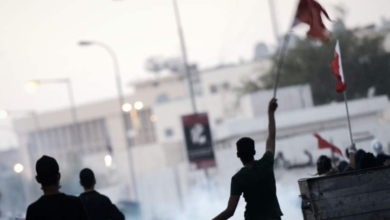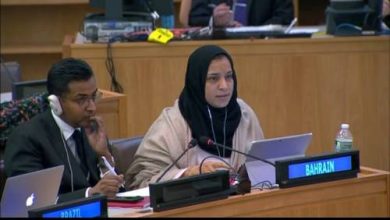Ten years on: Bahrain ‘crushed’ all dreams of reform, Amnesty says

Dissidents, human rights defenders, clerics and independent civil society have been effectively shut down since 2011 when mass protests called for reform, democracy and the fall of the monarchy, the leading rights organisation said in a new report.
Even Al-Wefaq, the largest legal opposition party in the country at the time, was dismantled and outlawed, with its founder Ali Salman and leading members thrown behind bars.
The second major opposition party, the non-sectarian Wa’ad, was also banned, and its former head Ebrahim Sharif served five years in prison for his role in supporting the protests in 2011.
“Since 2011, the only structural changes Bahrain has seen have been for the worse, as opposition parties have been outlawed, the only independent news outlet has been shut down, and new laws have further closed the space for political participation,” said Lynn Maalouf, Amnesty International’s Deputy Regional Director for the Middle East and North Africa.
“The protest leaders of 2011 continue to languish in grim prison conditions, and human rights including the right to freedom of expression are routinely trampled on,” Maalouf added.
A decade ago, mass demonstrations erupted in the tiny Gulf kingdom over mounting discontent, institutional sectarianism and state authoritarianism.
After launching a brutal and deadly crackdown on peaceful protests, Bahrain’s King Hamad bin Isa Al Khalifa commissioned an independent panel to address international concern over the suppression of protests.
However, ten years later, the kingdom has yet to act on recommendations by the Bahrain Independent Commission of Inquiry [BICI].
Among the recommendations from the November 2011 BICI report was a prompt investigation of all allegations of maltreatment by independent forensic experts, with the burden of proof on the state to show its compliance with law; removal of the national security intelligence agency from the process of domestic law enforcement; relaxation of censorship; and allowing the political opposition access to the state-controlled media.
“Yet ten years later, none of these recommendations have been implemented by the Bahraini authorities, in violation of their obligations under international human rights law,” Amnesty’s report noted.
The popular uprising, which centred around the iconic Pearl Roundabout in Manama’s financial district, saw hundreds of thousands of protesters set up camp for several weeks in a bid to call for change.
The 14 February movement was inspired by similar uprisings that swept across most of the region in 2011. But while calls for change in other nations, including Egypt, Tunisia and Yemen, seemed to make progress at the time, the movement in Bahrain remained somewhat stagnant.
Bahraini authorities swiftly responded with a brutal crackdown and called in a Saudi-led intervention force from the neighbouring Gulf states to help squash ambitions by pro-democracy protesters.
According to the BICI report, at least 19 individuals were killed by the authorities, eight of them due to excessive use of force by security forces, and five others due to torture. However, some opposition figures point to a much higher death toll.
“The Bahraini state has crushed the hopes and expectations raised by the mass protests of 10 years ago, reacting with a brutal crackdown over the subsequent decade that has been facilitated by the shameful silence of Bahrain’s Western allies, especially the UK and the US.”
Meanwhile, thousands of protest leaders and opposition figures were detained, some of which are still locked up in Bahraini prisons today.
Even the iconic Pearl Roundabout, which came to be a unifying symbol of the hopes of national renewal in February 2011, was bulldozed and paved over following the quashing of the uprising.
“The fate of Pearl Roundabout symbolises the Bahraini government’s attempt to suppress and erase even the memory of the protests. What was once a site of peaceful assembly, hope and progress is now just concrete and asphalt,” said Maalouf.
“We urge the authorities to reverse the terrible course of the past 10 years by adopting the full and effective implementation of all the recommendations in the BICI report, and for the immediate and unconditional release of those imprisoned solely for peacefully exercising their human rights, and for all the charges against them to be immediately dropped.”




